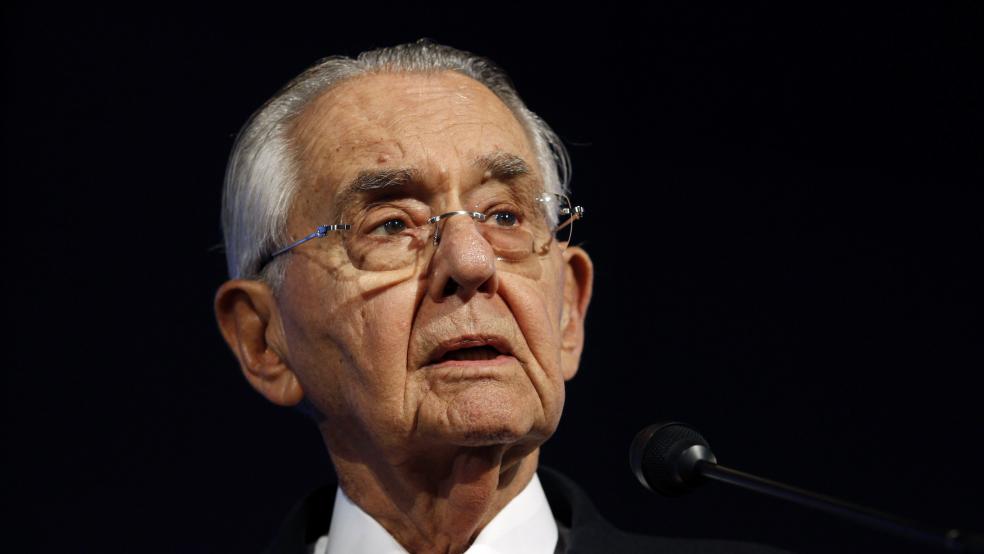Peter G. Peterson, the self-made billionaire businessman and former Secretary of Commerce under President Richard M. Nixon who went on to become a leading voice warning about the dangers of the growing national debt, died Tuesday. He was 91.
Peterson, the son of Greek immigrants, was born on June 5, 1926 in Kearney, Nebraska. As a child, he said, he worked at the cash register at the 24-hour diner his parents ran in the town. He went on to build an immensely successful career in business and finance, serving as chairman and CEO of Bell & Howell Corporation and Lehman Brothers before co-founding The Blackstone Group, the private equity giant, with Stephen A. Schwarzman in 1985.
Peterson also became a prominent and influential voice in national politics and public policy, with a special emphasis on fiscal issues. In 1992, he co-founded the Concord Coalition, a group “dedicated to educating the public about the causes and consequences of federal budget deficits, the long-term challenges facing America's unsustainable entitlement programs, and how to build a sound economy for future generations.”
From 2000 to 2004, Peterson was chairman of the Federal Reserve Bank of New York and he served as chairman of the Council on Foreign Relations from 1985 to 2007. In 2008, he launched the Peter G. Peterson Foundation, a nonpartisan nonprofit that says its mission is to increase awareness of America’s long-term fiscal challenges. Separately, Peterson also founded The Fiscal Times and has funded the publication since its inception.
“Some of Mr. Peterson’s proposals — cutting Social Security benefits for the wealthy, for instance, or eliminating the mortgage-interest deduction long cherished by middle-class homeowners — have been seen as political ‘third rails,’” David Stout wrote in a Washington Post obituary. “But he was credited with daring to say what others in positions of influence would not.”
Peterson’s legacy, both in finance and in the policy sphere, is immense. You can read more about him here, here or here.
A Fiscal Hawk, in His Own Words
As we remember Pete, there may be no better way to pay tribute to him than by sharing his own words, from his 2015 book “Steering Clear: How to Avoid a Debt Crisis and Secure Our Economic Future”:
“As a nation, we are all too focused on this year, or next, and often ignore and delay important decisions that affect the next generation. While many of my critics have labeled me a deficit scold (or worse) who is singularly obsessed with cutting entitlements and immediate austerity, the truth is that I am not principally concerned with this year’s deficit, or next year’s or even those over the next ten years. … And I resolutely believe that we must reform vitally important entitlement programs in a way that retains and strengthens their value for our most vulnerable citizens—particularly as we’ve seen troubling trends in wage stagnation and disturbing facts about income immobility in recent decades. Rather, my primary concern is the longer term unsustainable path of our debt and the threat it poses to the American dream.”
“… Now, some people might wonder why I am so persistent in sounding the alarm over America’s long-term debt. After all, why should an eight-eight-year-old billionaire—by any measure long on dollars and short on years—care so deeply about an issue that to many people seems both distant and arcane?
“The answer is simple: I am an American Dreamer, and this country has given my family and me—and millions of others—unequaled opportunities to dream and to prosper. And together we have a profound obligation to try to pass on the same opportunity to future generations. This isn’t just an economic imperative; it’s a moral imperative.”




